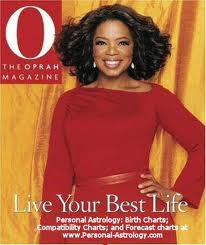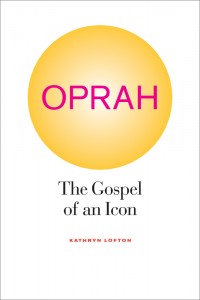 In the film, Monsters vs. Aliens, a delightful riff on alien encounter of movies of the 1950s, aliens appear, they aren’t nice, and the clueless U.S. government headed by an equally clueless President (Stephen Colbert) attempts to find a ready solution to the alien menace. As the staffer, generals, and advisors make rapid fire suggestions, one staffer proclaims: “It is at times like these that I wonder: What would Oprah do?” In the face of disaster, Oprah becomes the go-to guru of not only self-empowerment but also national salvation. What would Oprah do, indeed?
In the film, Monsters vs. Aliens, a delightful riff on alien encounter of movies of the 1950s, aliens appear, they aren’t nice, and the clueless U.S. government headed by an equally clueless President (Stephen Colbert) attempts to find a ready solution to the alien menace. As the staffer, generals, and advisors make rapid fire suggestions, one staffer proclaims: “It is at times like these that I wonder: What would Oprah do?” In the face of disaster, Oprah becomes the go-to guru of not only self-empowerment but also national salvation. What would Oprah do, indeed?
In her new book, Kathryn Lofton engages not only what Oprah does but what she is. The Immanent Frame posted an interview with Lofton about Oprah: The Gospel of an Icon (2011). While I will blog about the book later (I need to crack the packaging), the interview gets to what is at stake in the study of Oprah, her show, her brand, her influence for American religious history.
Here’s my favorite snippet of the interview:
NS: What is it about how American religious history is studied now that has left Oprah not well-enough understood?
KL: I would say that the “how” of what we study is less problematic than the way we cordon our topics, which is very much an inheritance of our role as seminary church historians. I want to see more books written about objects that seem unlikely for religious studies,such as those seemingly in the purview of pop culture, but also those from economic and political arenas. Moreover, I think our disposition toward our subjects is often too tender for our own good. If, on the one side, we’ve been formed by our seminarian genealogies, on the other, we inherit an abused mentality, one that flinches constantly at the possibility that elsewhere in the humanist ranks we’re being mocked for proximity to the religious subject. And so we appear, I think, often too defensive of our topics, believing they need caretaking before exposure to the imagined Marxist menace. So, if there is a critical edge to the book, it is to goad us to be less worried about explaining our subjects to their cultured despisers, and instead to pursue the mediations of their belief systems, the multiple functions of their ritual reiterations, and the social systems to which they reply and in which they participate. (Emphasis mine)
This question of what *counts* as evidence for American religious history as what, perhaps, does not is a crucial one that I have struggled continually with in my work. What *counts* as American religious history? The interview with Lofton compounded questions that have plagued me for weeks about how to understand the role of popular culture, consumption, and “secular” millennialism in the context and essential to how we talk about Americans, religion and practice. What evidence if cordoned? What evidence do we despise? What evidence receives a free pass? What would Oprah do?

Oprah, by Lofton’s standards, problematizes the work of American religious historians by injecting pop culture as a necessity to the larger vision of Americans and their religiosities. My particular interests are those “objects that seem unlikely for religious studies, such as those seemingly in the purview of pop culture, but also those from economic and political arenas.” My first post on this new blog was on zombies and consumption, and obviously, zombies might not fit nicely or neatly into the canon (academic not weaponry). Lofton’s interview suggests that there is also something clearly at stake in how we define something as religion and someones as the religious. (Moreover, there is something crucially important about the academic subjects we treat “tenderly” and those who do not merit such generosity.)
Gary Laderman’s Sacred Matters takes us a similar call of addressing what Americans are devoted to, and according to this excellent book, Americans find sex, celebrity, science, music, and guns sacred. In December of 2010, Laderman reflected on what we believed: war, money, sexual boundaries and the natural world to name only a few. Laderman, like Lofton, pushes the boundaries of what is religion and makes us consider what tropes, narratives and themes we deploy to construct stories of the religious lives of Americans. The question becomes not so much what would Oprah or zombies do, but what does their study show? How might we use popular culture to craft stories and as historical evidence?
All of this preliminary posturing is a way for me to say that Lofton’s book is now at the top of my reading list, and I can’t wait to see what Oprah can do for American religious history.
Kelly — I am really excited by your turn to evidence as a way of thinking about the formation of religious subjects. I look forward to talking more about all of this with you, through the O but also through, you know, zombies. — Katie
Katie, it strikes me that more and more of what we do as American religious historians is evaluating, approving and disapproving the “evidence” of religion, so I look forward to talking about this more as well. Your discussion of Oprah and branding at ASA keeps popping up more and more as I evaluate what kind of cultural forms tell the story of American apocalypticism. Thanks for stopping by.
Kelly the question of what “counts” is huge. I’ve been wrestling with it all week in my dissertation proposal draft. It’s all a matter of how we draw the boundaries of the “religious” in history, as you both point out.
It has been the case that scholars started with places where religion was easily isolated–institutions and denominations. The goal was to isolate the religious and then relate it to some larger narrative. But, Kelly and Kathryn, what I love about your zombies and your Oprah is that they move in the opposite direction. Rather then identifying and isolating the religious, the religious becomes a way into larger cultural processes that exceed our current boundaries. I’m running into this with my research on representations of “The Hindu” (or, even more colonial, “The Hindoo) in American culture–it’s not just religious difference, its racial, civilizational, gendered, commercial, etc.
The promise of this inward movement deeper into culture is that it will, hopefully, offer us richer life-worlds of subjects. But it seems to me that it is also incredibly challenging because these richer life-worlds may overspill our current theoretical boundaries and disciplinary tools.
Mike, it is nice to know that there is solidarity in this struggle. Moreover, I think it is not only worthwhile but necessary for scholars to grapple with how the religious is melded to cultural frameworks that don’t seem “religious.” For my new work on the apocalypse, I feel that this
problemquestion is unavoidable because of the presence of consumption, pop culture, gender, race and, well, zombies.This struggle has become evidence-based, but that is just because I can find the question easier to manage when I focus on what are the “sources” or the “evidence” of the apocalypse. How does the end materialize has become a helpful frame. Moreover, I think you are correct about the possibility of richer scholarship, but also the danger in overwhelming ourselves and the tools of the trade. Katie’s interview really crystallized my nervousness about my “new” sources in my new project: are they really historical? What her interview suggested to me though is that our “cordoning” of topics can limit our approaches to evidence, and that perhaps, my fervent belief that zombies tell us something not only about how apocalypticism continues to function in America but also American religious history.
Thanks for the good comments. They give me more to mull over.
Good stuff, Dr. Baker! Only someone who has consumed as much zombie literature and media as yourself would have considered the possibility that “zombies fitting into the canon” might actually be a valid discussion of ammunition usage!
I am reminded of quite animated discussion in Dr. Hulsether’s 499 last year after reading Chidester’s “The Church of Baseball, the Fetish of Coca-Cola, and the Potlatch of Rock ‘N’ Roll.” Suffice it to say that some people will not even CONSIDER the possibility that people actually do give ritualistic and symbolic meaning to some cultural happenings and artifacts which endue them with religious or “religious like” meaning!
Interestingly, many religious leaders have no problem making this connection. A common statement I have heard (and used myself in my days as a lay-minister, if the truth be told) is something on the order of “anything you give more attention and devotion to than God (capital “G”) is your “god.” I have seen versions of this statement since in various other religions, but it still seems hard for some who study these religions to grasp.
(disclaimer: the author of this brief – and somewhat rambling – response is in no wise suggesting that every cultural theme or thing that anyone holds to be of importance is thereby their religion… but if anyone finds themselves getting aggravated by the possibility of such a suggestion… well, I’m just saying, that’s all)
Jeremy, thank you for dropping in, and I do appreciate the use of zombie parts in all kinds of weaponry 🙂 To your point about how things become religious, I do a whole section in my Intro to American Studies on what “religion” in the U.S. actually is. I frame the section by asking what are we devoted to (facebook? blogging? celebrities? guns?) and where we spend our time and energy. What rituals do we develop? Does everyone incessantly check facebook like I do? Additionally, religious people do take this very seriously. Laderman had an excellent piece up at Religion Dispatches last summer on “Who’s Afraid of Sacred Soccer?” about clergy responses to laity support and keen devotion to the World Cup.